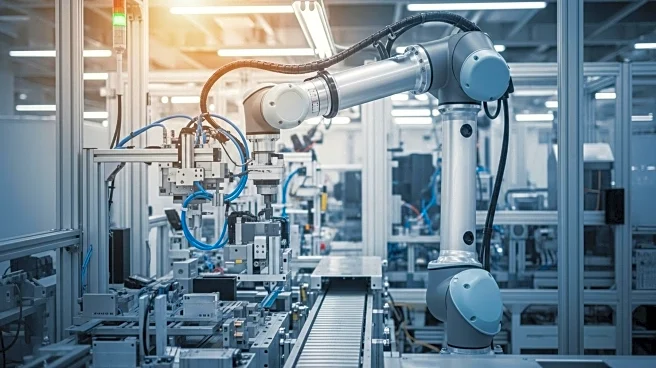What's Happening?
The Mercedes-Benz Ludwigsfelde plant, a key part of Mercedes-Benz Vans' global production network, is undergoing significant changes as it transitions towards electromobility. Since its establishment in 1991, the plant has received substantial investments, including €200 million between 2017 and 2025, aimed at modernizing production systems and advancing electromobility. Despite these investments, the plant faces challenges due to global automotive sector pressures, including U.S. tariffs and competition from Chinese EV manufacturers. The transition to electric van production raises concerns about workforce displacement, with potential reductions in employment from 2,000 to 500 employees by 2030. The company's austerity program, targeting €5 billion in savings by 2027, further complicates the situation, risking employee morale and regional labor market stability.
Why It's Important?
The developments at the Ludwigsfelde plant highlight the broader challenges faced by the automotive industry in balancing innovation with workforce retention. The plant's strategic investments in automation and electrification align with industry trends but also underscore vulnerabilities in regional economic dependencies. Eastern Germany, already facing higher unemployment rates compared to the national average, could experience amplified risks if job cuts materialize. The situation underscores the need for effective government interventions to address systemic regional disparities and stabilize the industrial base.
What's Next?
Brandenburg's Minister of Economic Affairs, Jörg Steinbach, has urged Mercedes-Benz to outline a clear production plan beyond 2030 to stabilize the region's industrial base. The company's commitment to extending job security guarantees until 2035 and its focus on socially responsible restructuring are commendable, but may not fully offset the pressures of declining profitability and sector-wide job cuts. The automotive industry's broader struggles, exemplified by a 7% workforce reduction across Germany in 2024, further complicate efforts to maintain regional stability.
Beyond the Headlines
The Ludwigsfelde case illustrates the tension between strategic industrial investment and the realities of a globalized, cost-conscious market. While Mercedes-Benz's commitment to extending job security guarantees until 2035 and its focus on socially responsible restructuring are commendable, they may not fully offset the pressures of declining profitability and sector-wide job cuts. The automotive industry's broader struggles, exemplified by a 7% workforce reduction across Germany in 2024, further complicate efforts to maintain regional stability.









